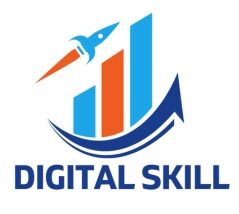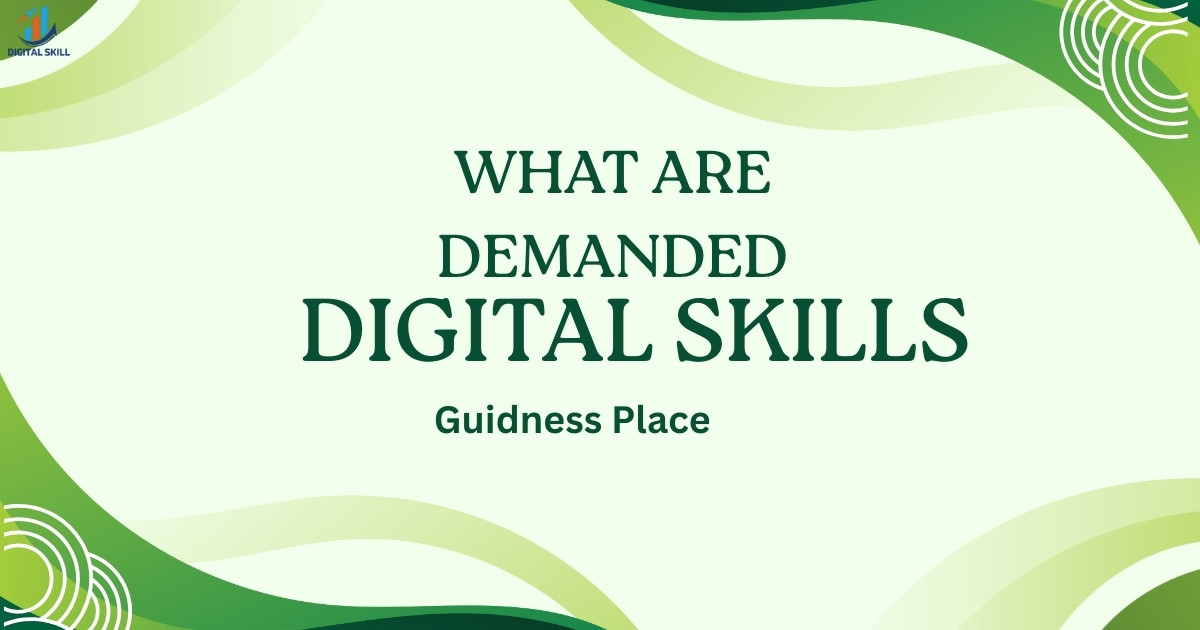Discover What Are Demanded Digital Skills in 2026 learn essential abilities, career benefits, and growth tips to succeed in today’s digital world.
❶💗What are the demanded digital skills? Overview and Importance:
In an increasingly interconnected world, understanding what digital skills will look like in 2026 is pivotal for shaping future careers. As technology rapidly evolves, the importance of digital literacy in the modern workforce cannot be overstated; it is now a prerequisite for thriving in almost any industry. Digital skills extend beyond basic tech know-how, encompassing advanced skills in areas like digital marketing and communication, which are increasingly linked to high-income opportunities. Platforms such as the global digital skills hub are vital resources for beginners. This hub creates a unique space where the connection between education, technology, and career growth becomes evident. Organizations face a significant digital transformation skills gap.
- Importance of digital literacy in the modern workforce: Digital literacy is essential in the modern workforce as it enables employees to effectively use technology, communicate, and adapt to digital tools for better productivity and innovation.
❷💗Understanding Digital Skills
Digital skills encompass a wide array of competencies essential for navigating today’s tech-driven landscape. At their core, digital skills can be categorized into three main levels. Basic digital skills include everyday tasks like email management and file organization, laying the groundwork for one’s digital fluency. Intermediate skills, such as data entry and creating engaging presentations, enable users to harness tools effectively, enhancing productivity and fostering collaboration. On the other hand, advanced digital skills, which encompass programming, analytics, and mastery of AI tools, are increasingly vital for digital leadership providing individuals with the capabilities to drive transformation within organizations. The impact of strong digital communication skills cannot be overstated; they act as the backbone of efficient online collaboration.
Definition and Meaning of Digital Skills:
Digital skills are the ability to use digital devices, communication applications, and networks to access, manage, create, and share information effectively.
Categories of digital skills:
- Basic digital skills (email, file management, search),
- Intermediate digital skills (data entry, presentations, spreadsheets),
- Advanced digital skills (programming, analytics, AI tools, marketing),
❸💗Why Digital Skills Matter in 2026
In 2025, the digital economy’s landscape will be indelibly shaped by the demand for digital leadership skills. Companies that proactively address the skills gap will not only enhance their operational efficiency but also drive sustainable growth. This gap, often overlooked, can significantly hinder innovation and competitiveness, costing businesses both in productivity and market relevance. As organizations transition into robust digital frameworks, the need for adept personnel who can navigate complex technologies becomes paramount.Case studies from universities like SDSU show proactive strategies in bridging the digital skills gap, providing students with essential tools via their digital skills login portal. These institutions are training the next generation to harness technologies like Google’s app suite, equipping them with skills that are increasingly sought after in the workforce. This educational pivot highlights a vital truth: addressing the skills gap is not merely an academic concern but a fundamental element of global transformation. As businesses adapt, those that cultivate a digitally fluent workforce will not only thrive but redefine the landscape of their industries.
- Role of digital transformation skills gap in company growth:
The digital transformation skills gap hinders company growth by limiting innovation, efficiency, and competitiveness in a technology-driven market.
- cost of digital skills gap in the workforce:
The cost of the digital skills gap in the workforce includes reduced productivity, higher training expenses, and missed business opportunities.
Case study:
Universities (like SDSU digital skills login / SDSDU digital skills) bridging the learning gap
❹💗High-Income Digital Skills
High-income digital skills are revolutionizing the job market, making digital marketing a focal point for aspiring professionals. Skills like SEO & content strategy, social media management, and data analytics not only enhance brand visibility but also drive tangible results for businesses. Understanding these top-paying digital careers for 2025 can illuminate pathways to lucrative opportunities. Companies actively seek individuals who can craft compelling narratives and analyze data trends, creating a demand that far outstrips supply. Mastering these hard skills in digital marketing is increasingly accessible through online platforms. Resources like Coursera and Udemy offer specialized courses, enabling learners to gain practical experience and adapt to industry trends swiftly. Meanwhile, web development and UX/UI design remain cornerstones of successful digital strategies, blending creativity with technical expertise.
| Skills | Description | Potential Earning |
|---|---|---|
Web Development | Building and maintaining websites using languages like HTML, CSS, JavaScript, and frameworks. | $60,000 – $130,000 |
| Data Analysis | Interpreting and visualizing data to help businesses make informed decisions. | $55,000 – $115,000 |
| Digital Marketing | Promoting products or brands through online channels like social media, SEO, and paid ads. | $50,000 – $120,000 |
Cybersecurity | Protecting systems and networks from digital attacks and ensuring data privacy. | $80,000 – $160,000 |
| Artificial Intelligence (AI) & Machine Learning (ML) | Developing intelligent algorithms that learn from data and automate decisions. | $90,000 – $180,000 |
- How to master digital marketing hard skills:
To master digital marketing hard skills, focus on hands-on learning through online courses, real-world projects, data analysis, SEO, paid advertising, content creation, and continuous practice with digital tools and analytics platforms.
❺💗Building a Digital Skills Hub for Learning
A digital skills hub serves as a centralized platform where learners can access a wealth of resources aimed at enhancing their digital competencies. By blending various educational tools and interactive content, these hubs provide tailored learning paths that cater to individual needs, making it easier for participants to absorb complex concepts. What is a digital skills hub, if not a vibrant ecosystem that fosters collaboration and innovation? This engaging environment allows users to share insights, ask questions, and rapidly prototype ideas in real-time, cultivating a sense of community that traditional classrooms often lack. Joining an online learning ecosystem offers myriad benefits, from flexibility in pacing to access to diverse global perspectives. As learners interact with peers from different backgrounds, they gain new ideas that broaden their thinking and challenge preconceived notions. Platforms like Coursera and Udacity exemplify this trend, offering courses designed by industry leaders that empower individuals to equip themselves with in-demand skills.
- digital skills hub?
A digital skills hub is a centralized platform that provides resources, courses, and tools to help individuals learn and develop essential digital skills for career growth.
- Benefits of joining an online learning ecosystem:
The benefits of joining an online learning ecosystem include flexible learning, access to global experts, diverse courses, career advancement opportunities, and community collaboration.
- Examples of global platforms :
- Coursera,
- Udemy,
- LinkedIn Learning
- Google Digital Garage,
- FutureLearn.
❻💗The Role of Education in Digital Literacy
As schools and colleges increasingly integrate technology into their curricula, tools like CDougal Littell Algebra’s digital editions exemplify how educational materials are evolving. These platforms not only enhance traditional learning methods but also foster a deeper understanding of digital literacy among students. By blending interactive content with mathematical concepts, educators are providing an engaging learning experience that sharpens critical thinking and problem-solving skills essential for the digital age. The competition between academic institutions and online academies plays a pivotal role in bridging the digital skills gap. As online programs offer flexible access to a wealth of resources, traditional schools are rethinking their approaches to prepare students for a tech-driven workforce.
- schools and colleges are integrating tech (e.g., CDougal Littell Algebra digitaleditions),
- Academic institutions vs. online academies bridging the digital skills gap,
VII. Overcoming the Digital Transformation Skills Gap
Overcoming the digital transformation skills gap requires a multifaceted approach that addresses common barriers for learners and employees. Many individuals face challenges such as lack of access to resources, outdated training methods, or insufficient organizational support. To bridge this gap, companies must cultivate a culture of continuous learning and adaptability, fostering an environment where innovation is encouraged, and employees feel empowered to expand their skillsets. Strategies companies use to facilitate this transformation include personalized learning paths tailored to individual strengths and weaknesses, enabling employees to engage with the material at their own pace. By proactively addressing these barriers and investing in tailored development initiatives, organizations can not only enhance their workforce’s digital competency but also unlock new avenues for growth and innovation.
- Common barriers for learners and employees:
- limited access to technology,
- lack of time,
- insufficient digital literacy,
- financial constraints,
- low motivation or organizational support.
FAQS:
1. What are digital skills?
Digital skills refer to the abilities needed to use technology effectively, encompassing everything from basic computer operations to advanced data analysis.
2. Why are digital skills important?
Digital skills are crucial in today’s job market, as they enhance employability, improve productivity, and enable individuals to navigate an increasingly digital world.
3. Who can benefit from learning digital skills?
Anyone, from students to professionals and retirees, can benefit. Digital skills are essential across various fields and can enhance personal and professional growth.
4. What are some examples of digital skills?
Examples include basic computer literacy, online communication, social media management, data analysis, and understanding cybersecurity principles.
5. How can I start learning digital skills?
You can start learning through online courses, tutorials, community workshops, or even self-study using free resources like YouTube and educational websites.
6. Are digital skills the same as computer skills?
Not exactly. While computer skills are part of digital skills, the latter also includes understanding the internet, software applications, and digital communication tools.
7. What resources are available for learning digital skills?
Numerous resources exist, including online platforms like Coursera, Udemy, and Khan Academy, as well as local community colleges and libraries offering classes.
8. How can digital skills affect my career advancement?
Proficiency in digital skills can open up new job opportunities, lead to promotional prospects, and increase overall job security in a technology-driven workforce.
Conclusion:
In today’s fast-changing tech era, understanding What Are Demanded Digital Skills is essential for career growth and long-term success. These skills not only enhance employability but also open doors to better opportunities, higher income, and professional confidence. By learning, upgrading, and adapting the right digital skills, anyone, beginner or professional, can stay relevant, competitive, and future-ready in 2026 and beyond.

